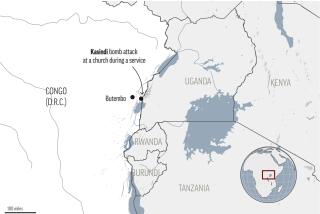Car Bomb in Algeria Kills 38, Wounds 256 : Terrorism: Explosion occurs on busy street in capital. No one claims responsibility, but police blame Muslim militants.
- Share via
ALGIERS — In the worst bombing of a three-year Muslim insurgency in Algeria, an explosives-packed car blew up Monday along a street bustling with people preparing for a religious holiday. At least 38 people were killed and 256 wounded, state television said.
The bomb went off across the street from police headquarters, near the main post office and train station. Downtown businesses were particularly crowded in anticipation of the monthlong Muslim holiday of Ramadan.
The car, containing more than 220 pounds of explosives, was driven by a “volunteer of death” who perished in the blast, security forces said.
There was no claim of responsibility. The security forces blamed “criminals”--the official term for fundamentalist guerrillas seeking to topple the army-backed government and install an Islamic state.
An estimated 30,000 people--including about 80 foreigners--have been killed in fighting between the militants and security forces since January, 1992. Nine people died in a bombing at Algiers airport in August, 1992.
The powerful bomb incinerated numerous cars, shattered windows in buildings several blocks away and blew a crater in the sidewalk nearly two yards wide and more than 20 inches deep.
It exploded at 3:20 p.m. in front of a bank office. People with faces and hands bloodied by flying glass ran frantically through the street, and ambulances rushed to the scene.
State radio instructed all doctors to report to work and appealed for volunteer blood donors.
The car that contained the bomb was reduced to a heap of twisted metal. The radio said it was a white Fiat stolen earlier in the day in the Algiers suburb of Larba, a Muslim fundamentalist stronghold.
Policemen clutching automatic rifles and backed by armored vehicles cordoned off the area, pushing and sometimes kicking away would-be onlookers.
Sporadic automatic gunfire was heard shortly after the explosion, possibly from nervous officers firing into the air. But by evening, shops in the area were closed, sidewalks almost deserted and the district eerily quiet.
Bombs have been used increasingly in the past year of the conflict, a guerrilla-style struggle that previously had been mainly confined to gun and knife attacks.
More to Read
Sign up for Essential California
The most important California stories and recommendations in your inbox every morning.
You may occasionally receive promotional content from the Los Angeles Times.













